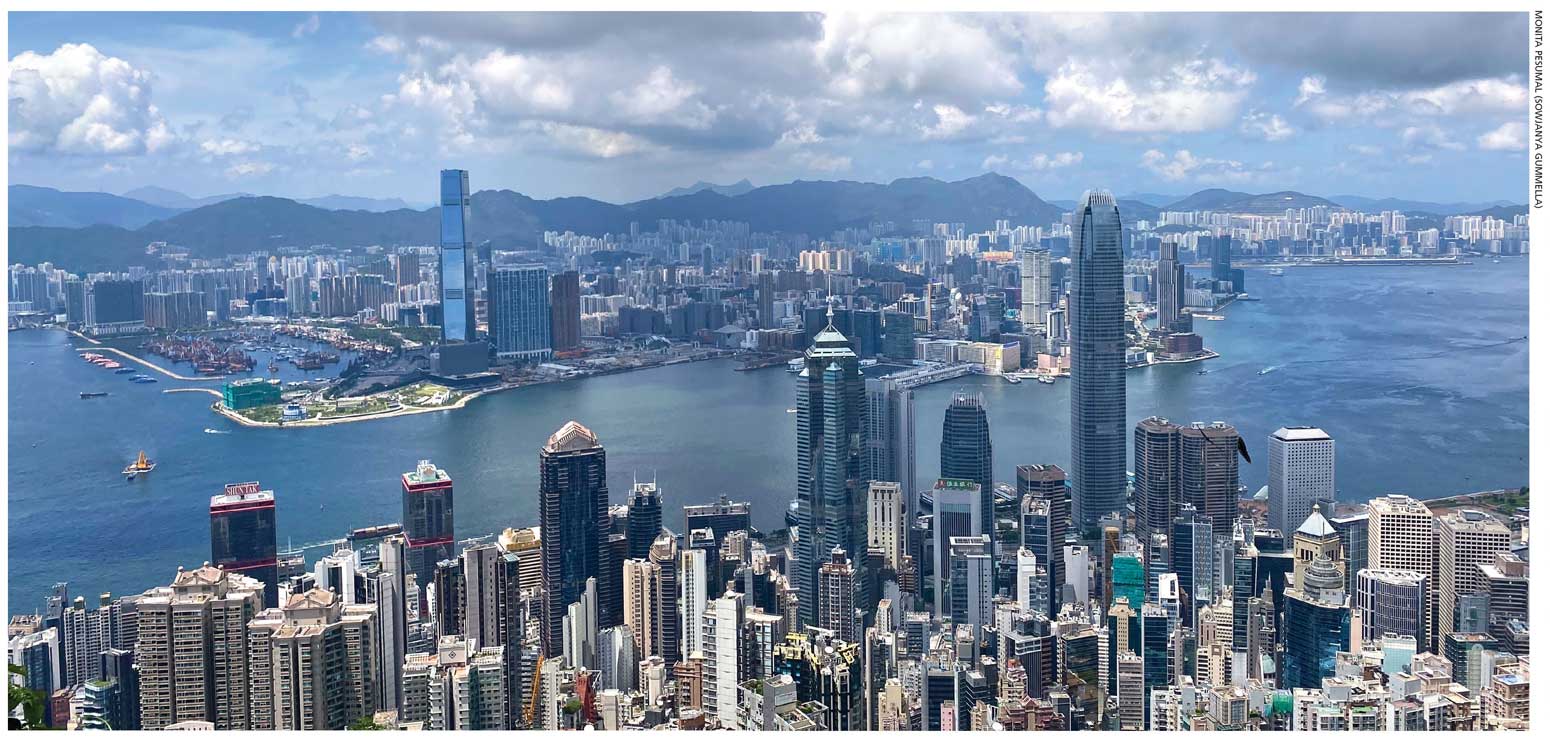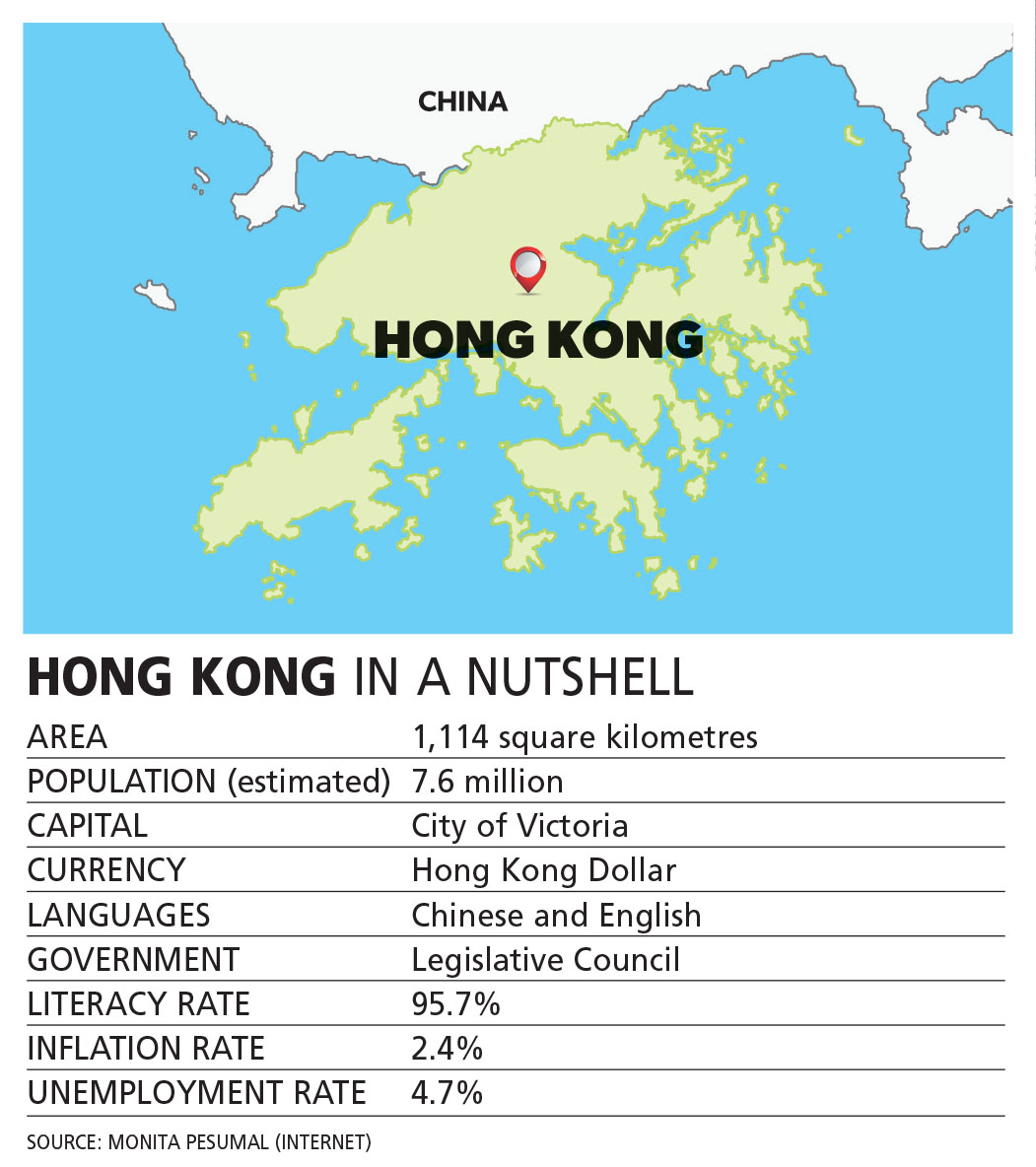HONG KONG TODAY
ONE COUNTRY TWO SYSTEMS
Monita Pesumal profiles the economy of a semiautonomous ‘special administrative region’ of China
The easiest way to do it when profiling national economies is to research the topic, and then turn those facts into meaningful and descriptive words that paint an accurate picture. There is also the possibility of extracting facts from mainstream and social media, to frame the context and content of the profile.
However, a far better option is to speak to relevant sources. So I interviewed a resident of Hong Kong – and this is what he had to say: “The economy has slowed down because of border closures. There’s less tourism as there is compulsory quarantine. Retail stores are closing but rents are still soaring.”
“People in Hong Kong are extremely hardworking and skilful, and the government is incredibly supportive. It offers incentives and vouchers to encourage consumption, and consumer spending. But because of COVID-19, the government is taking extraordinary measures to prevent the virus from spreading. Money wise, the government has a lot of it – so development continues,” he elaborates.
That’s quite an accurate summary of the present state of the world’s 33rd largest economy. Hong Kong, which is a Special Administrative Region (SAR) of China, is one of the most services-oriented economies in the world – with the corresponding sectors accounting for over 90 percent of GDP.
The economy of this SAR is powered by four key industries – financial services, tourism, trading and logistics, and professional services. These industries have traditionally been the driving force behind Hong Kong’s economic growth and employment opportunities. In 2020, these collectively employed over 1.5 million residents.
Hong Kong is also positioned as a global technology and innovation hub. The Hong Kong Science Park is the largest R&D and business incubation base in the SAR, and is home to over 1,100 enterprises and more than 17,000 innovators.
The government has also established a US$ 5 billion Strategic Tech Fund to invest in technology enterprises and projects that are of developmental value to Hong Kong.
In the first quarter of 2022, the country’s economy contracted by four percent year on year in real terms after an increase of 4.7 percent in the fourth quarter of 2021. Considering the support from state initiatives, the government forecasts Hong Kong’s real GDP growth for 2022 to be between one and two percent.
In its 2022/23 budget, the government has allocated HK$ 66 billion to issue electronic consumption vouchers worth 10,000 dollars to each eligible Hong Kong resident.
Financial Secretary Paul Chan says that the territory boasts resilient public finances and an effective mechanism to monitor financial risks, and adds that it has foreign exchange reserves of over US$ 440 billion. Local banks also conduct their business prudently.
At the end of 2021, Hong Kong’s stock market (of which the Hang Seng Index is a key indicator) was ranked the fourth largest in Asia and the seventh largest in the world with total market capitalisation reaching US$ 5.4 trillion. Hong Kong is also the fourth largest IPO fundraising market in the world with 42.3 billion dollars being raised through IPOs in 2021.
The COVID-19 pandemic has hit Hong Kong hard and brought tourism, which is one of the driving forces of its economy, to a virtual standstill. In pre-pandemic 2019, Hong Kong was the 20th most visited city in the world with a whopping 26 million arrivals.
In 2021 however, only 91,000 tourists visited the territory due to its zero COVID-19 tolerance policy and mandatory hotel quarantine, which is still seven days long. Despite the lack of tourist arrivals, Hong Kong International Airport was the world’s busiest for international air cargo last year.
In July, the South China Morning Post reported that the government is “actively considering” cutting Hong Kong’s mandatory hotel quarantine period for arriving visitors to either three or four days as it introduces a new colour coded health system aimed at better enforcing COVID-19 rules. Over 6.3 million residents have received at least one dose of the COVID-19 vaccine.
On the political front, John Lee became the Chief Executive of Hong Kong on 1 July. He was sworn in by Chinese President Xi Jinping, who timed his visit to mark the 25th anniversary of the return of the SAR to Chinese rule by the British.
“Hong Kong has withstood one severe challenge after another and overcome one hazard after another,” Xi noted in his brief speech upon arrival, and added: “After the storm, Hong Kong has been reborn from the ashes, showing flourishing vitality.”
Lee is the first chief executive to be installed since antigovernment protests and unrest rattled Hong Kong in 2019. He was the sole candidate preferred to lead the territory of 7.5 million, and replaced Carrie Lam after receiving over 99 percent of votes in a secret ballot conducted with about 1,400 members of a pro-Beijing election committee.
He promises to usher in a “new chapter” for Hong Kong over his five year term and aims to repair the city’s standing as a global financial hub.






